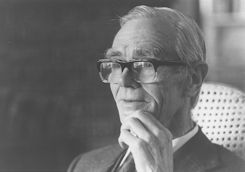
Owen Barfield was born in 1898, twenty days before C.S. Lewis, during the last years of the Victorian era. He died in 1997, a few months after Tony Blair became British Prime Minister.
Educated at Oxford, a solicitor for most of his working life, he lived in London and Sussex. He wrote novellas, poems, plays, books and essays. In his youth, he became an expert gymnast and philologist.
Above all, he devoted his efforts insofar as he could “to the secret life of words”, as biographers Philip and Carol Zaleski put it in their account of the Inklings. Barfield was a founding member of the fabled circle that included C.S. Lewis and J.R.R. Tolkien. He was the last of them to die.
He first met Lewis when he went up to Wadham College in 1919. It was not a happy time for him. He became acutely depressed by what he later called “the caged materialism of the age”. In a letter to a friend, he described feeling as if he were falling in on himself “like an ingrowing toe-nail”.
“My self is the only thing that exists, and I wear the external world about me like a suit of clothes – my own body included,” he continued. The sense of feeling trapped in his inner life, like a castaway on an island of consciousness, was for a time intolerable.
A combination of love and poetry was his salvation. They brought a redemption that came without warning one evening in 1920 when the clouds of his despondency lifted. It was a radical re-orientating of his mind, a conversion, which he understood as a spiritual awakening: at base, he had been cured of a spiritual disease.
He realised that a desire for beauty, which had been stirred by falling in love with the woman who would become his wife, could be found not only in his mind, not only in his beloved, but throughout the cosmos and nature. There is a store of treasures that is permanent and never ceases giving. The revelation was profound and determinative, shaping the rest of his life.